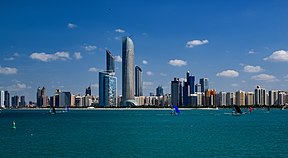Abu Dhabi
أبوظبي ʾAbū Ẓabī | |
|---|---|
| Coordinates: 24°28′N 54°22′E / 24.467°N 54.367°E | |
| Country | |
| Emirate | |
| Municipal region | Central Capital District[1] |
| Government | |
| • Type | Municipality |
| • Body | Abu Dhabi City Municipality |
| • Director-General of City Municipality | Saif Badr al-Qubaisi |
| Area | |
• Total | 972 km2 (375 sq mi) |
| Elevation | 27 m (89 ft) |
| Population (2023)[3] | |
• Total | 1,570,000[2] |
| Demonyms | Abu Dhabian, Dhabyani |
| GDP | |
| • Total | US$ 118.4 billion (2023) |
| • Per capita | US$ 76,600 (2023) |
| Time zone | UTC+4 (UAE Standard Time) |
| Website | tamm.abudhabi |
Abu Dhabi[a] is the capital city of the United Arab Emirates. The city is the seat of the Abu Dhabi Central Capital District, the capital city of the Emirate of Abu Dhabi, and the UAE's second-most populous city, after Dubai. The city is situated on a T-shaped island, extending into the Gulf from the central-western coast of the UAE.
Abu Dhabi is located on an island in the Persian Gulf, off the Central West Coast. Most of the city and the Emirate reside on the mainland connected to the rest of the country. As of 2023[update], Abu Dhabi's urban area had an estimated population of 2.5 million,[5] out of 3.8 million in the emirate of Abu Dhabi.[6] The Abu Dhabi Investment Authority is headquartered in the city, and was the world's 3rd largest sovereign wealth fund in 2022.[7] Abu Dhabi itself has over a trillion US dollars worth of assets under management in a combination of various sovereign wealth funds headquartered there.[8]
Abu Dhabi houses local and federal government offices and is the home of the United Arab Emirates Government and the Supreme Council for Financial and Economic Affairs. The city is home to the UAE's President, a member of the Al Nahyan family. Abu Dhabi's rapid development and urbanisation, coupled with the massive oil and gas reserves and production and relatively high average income, have transformed it into a large, developed metropolis. It is the country's centre of politics and industry, and a major culture and commerce center. Abu Dhabi accounts for about two-thirds of the roughly $503 billion UAE economy.[9]
- ^ Cite error: The named reference
OBG2016was invoked but never defined (see the help page). - ^ a b "TelluBase—UAE Fact Sheet (Tellusant Public Service Series)" (PDF). Tellusant. Retrieved 11 January 2024.
- ^ "Middle East :: United Arab Emirates". Central Intelligence Agency. Archived from the original on 7 January 2022. Retrieved 5 April 2013.
- ^ "How did Dubai, Abu Dhabi and other cities get their names? Experts reveal all". UAE Interact. 3 October 2007. Archived from the original on 7 April 2014. Retrieved 5 April 2013.
- ^ "Abu Dhabi Population 2023". Abu Dhabi Census. 11 June 2023. Retrieved 11 June 2023.
- ^ "Abu Dhabi Census 2023" (PDF). scad.ae. 2023. Archived from the original (PDF) on 25 October 2018. Alt URL
- ^ "Top 100 Largest Sovereign Wealth Fund Rankings by Total Assets". Saudi 24 News. 16 August 2020. Archived from the original on 8 May 2020. Retrieved 20 February 2023.
- ^ Bloomberg (2 March 2021). "Wealth fund newbie comes into focus in Abu Dhabi's $1 trillion sovereign hub". Gulf Business. Archived from the original on 23 May 2021. Retrieved 1 April 2021.
- ^ "Abu Dhabi economy grows 5.2 pct in 2013, slower than expected". gulfnews.com. 3 June 2014. Archived from the original on 26 January 2021. Retrieved 25 December 2020.
Cite error: There are <ref group=lower-alpha> tags or {{efn}} templates on this page, but the references will not show without a {{reflist|group=lower-alpha}} template or {{notelist}} template (see the help page).










